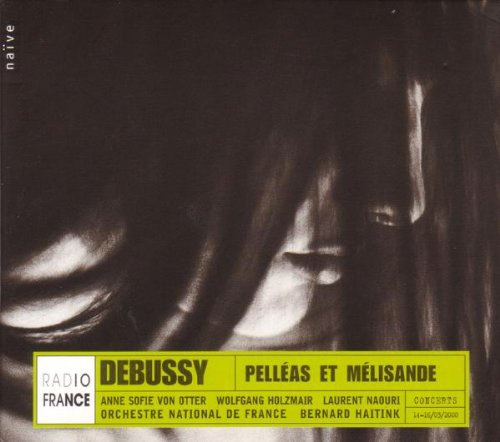Debussy Pelléas et Mélisande
HAITINK’S IS SIMPLY ONE OF THE FINEST CONDUCTED PELLEAS ET MELISANDES ON RECORD
View record and artist detailsRecord and Artist Details
Composer or Director: Claude Debussy
Genre:
Opera
Label: Astrée Naïve
Magazine Review Date: 4/2002
Media Format: CD or Download
Media Runtime: 160
Mastering:
DDD
Catalogue Number: V4923

Tracks:
| Composition | Artist Credit |
|---|---|
| Pelléas et Mélisande |
Claude Debussy, Composer
Alain Vernhes, Arkel, Bass Anne Sofie von Otter, Mélisande, Soprano Bernard Haitink, Conductor Claude Debussy, Composer Florence Couderc, Yniold, Soprano French National Orchestra Hanna Schaer, Genevieve, Contralto (Female alto) Jérome Varnier, Shepherd, Baritone Jérome Varnier, Doctor, Baritone Laurent Naouri, Golaud, Baritone Radio France Chorus Wolfgang Holzmair, Pelléas, Baritone |
Author:
Bernard Haitink has always had a soft spot for French music‚ where his control of texture and pace often brings out beauties and strengths that other conductors do not find. Pelléas et Mélisande‚ for which longterm flow is a crucial requirement‚ is ideally suited to his talents. He has the ability‚ like a good games player‚ to create his own time and space. His Act 1‚ at 31'32"‚ is about average in length‚ but he manages to make it seem spacious and otherworldly because the flow between tempos is so finely judged – nothing is hurried or arbitrary‚ everything is dictated by a kind of life force (or death force‚ depending on which character you identify with).
In the opening scene Haitink has already painted a picture of the forest by the time we reach bar 7‚ with string chords eloquently evoking ‘once upon a time’ and a woodwind crescendo just emphatic enough to carry menace. He takes no prisoners when this menace explodes at the ends of Acts 3 and 4‚ with the end of Act 3 on the very edge of roughness‚ as it should be‚ almost tipping over into incoherence. Throughout‚ the beauty‚ energy and brilliance of the orchestral playing ride over an undertow of melancholy and impending disaster‚ echoing that ‘strange air’ Mélisande has of someone who‚ in Arkel’s words‚ ‘is always waiting for some great sorrow in the sunshine in a lovely garden’.
Haitink is well served by his singers. Holzmair is a freshvoiced‚ ardent but elegant Pelléas‚ and innocent enough to make his entrapment plausible. Even the slight signs of tiring on his high notes in Act 4 can be heard as portraying vulnerability. Anne Sofie von Otter plays Mélisande in the traditional way as timid and fatally seductive; as Virgil Thomson once observed‚ ‘a lonely girl with a floating libido and no malice toward anyone can cause lots of trouble in a wellorganised family.’ But von Otter brings more vibrato to her top notes than some other interpreters and this gives her timidity a slightly used‚ passiveaggressive colouring‚ as though she has employed her don’ttouchme gambit several times in the past‚ and has found it works.
Laurent Naouri is a supremely intelligent Golaud‚ slow to jealousy and anger (his conversation with Mélisande in Act 2 scene 2 is conducted on a quiet‚ intimate level‚ persuading us that he really loves her and that she is not just the object of his desire to possess and control)‚ but terrifying when the dam finally bursts. By contrast‚ in the final act he is the image of a spiritually lost soul and his choked cries of ‘Mélisande!’ are truly heartrending.
Alain Vernhes’s Arkel has that ‘goodness’ in his tone that the composer wanted‚ rejecting more recent approaches that have turned the king into a sententious‚ snappish‚ even lustful geriatric‚ and I am sorry that his pitching‚ hitherto perfect‚ wanders somewhat in Act 5. Hanna Schaer as Geneviève invests her role with the required calm and sympathetic dignity and clear diction‚ and only the Yniold of Florence Couderc seems to me miscast‚ sounding unmistakably feminine – perhaps she carried more conviction on the stage of the Théâtre des ChampsElysées.
Members of the French National Orchestra are‚ I gather‚ still talking two years later of this Pelléas as a high point in their professional lives. It is not to be wondered at: Haitink gives us a deeply serious and powerful interpretation of the opera‚ one that sets a new standard in the work’s centenary year.
Discover the world's largest classical music catalogue with Presto Music.

Gramophone Digital Club
- Digital Edition
- Digital Archive
- Reviews Database
- Full website access
From £8.75 / month
Subscribe
Gramophone Full Club
- Print Edition
- Digital Edition
- Digital Archive
- Reviews Database
- Full website access
From £11.00 / month
Subscribe
If you are a library, university or other organisation that would be interested in an institutional subscription to Gramophone please click here for further information.




